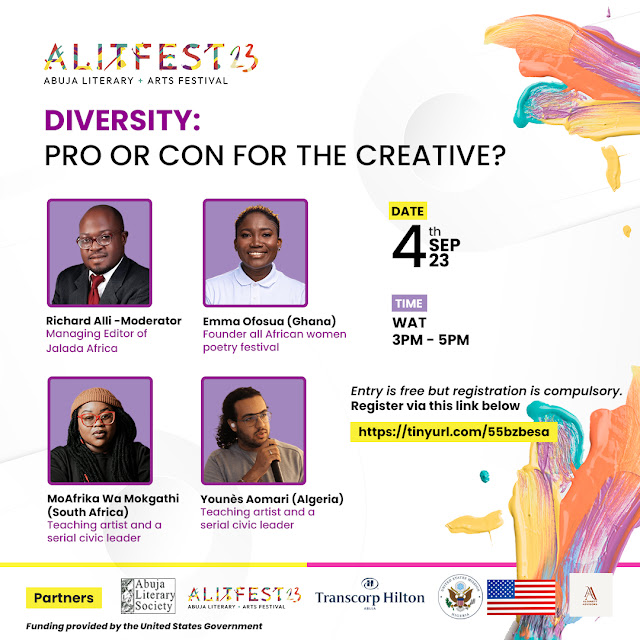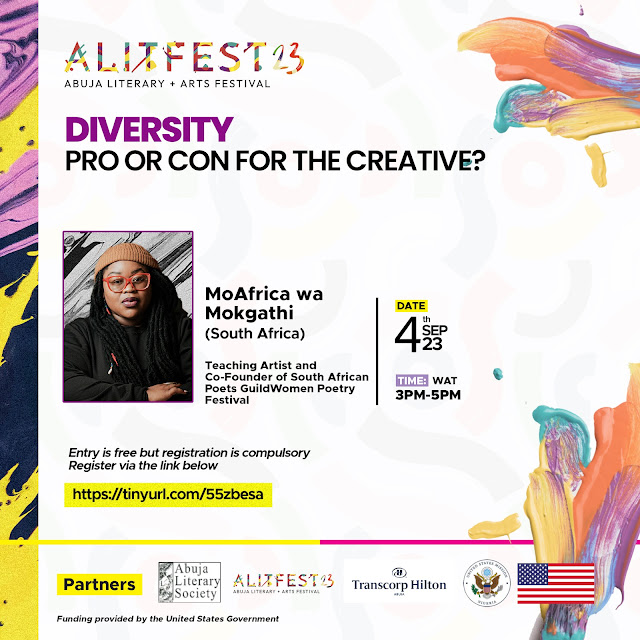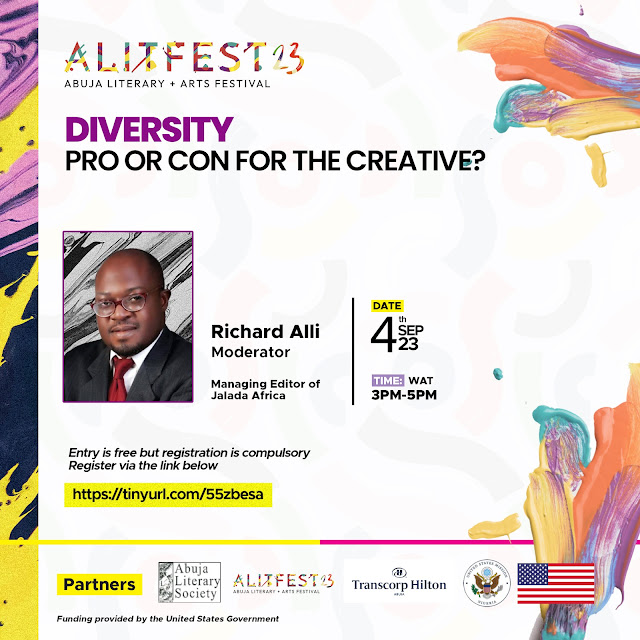By Atinuke Adeosun
Introduction:
The 2023 Abuja Literary and Arts Festival (ALitFest) is happening from September 3 - 10, 2023. The theme for the festival this year is 'Becoming One With the Other' and it is a celebration of literature and art through workshops and booth camps, a stage play, panel session, book and art fairs, film screening, fashion and art exhibitions, music and poetry concert, the poetry grand slam, and a gala night with sponsors.
The first panel discussion of the festival, “Diversity: Pro or Con for Creatives”, ignited a dynamic conversation about the significance of diversity in African storytelling. This panel transcended geographical borders and limitations, delving deep into the challenges, intricacies, and profound impact of diversity on creative endeavors. The panelists included Younés Aomari, a Moroccan spoken word artist, public speaker, and civic leader; Emma Ofosua from Ghana, the Founder of the All African Women Poetry Festival; and MoAfrika Wa Mokgathi from South Africa, a teaching artist and committed civic leader, engaged participants from various African nations. The session was moderated by Richard Alli, the Managing Director of Jalada Africa, who skillfully guided us through the ongoing efforts to champion diversity in African storytelling.
Diversity as a Catalyst for Creativity
Richard set the stage by emphasizing the complexity of our world and the role of creative individuals in interpreting and understanding it. He stressed that diversity is a live-wire topic for creatives, as they are tasked with making sense of the conundrum of our lives. Richard introduced the panelists and welcomed Younés Aomari, also known as Otaku Flow.
Younés opened his discussion and delved into the theme of diversity and creativity: "For us as creative artists, the diversity we are experiencing today is nothing but the result of the creativity of our ancestors. And the very interesting part in this process is that creativity leads to diversity. As we experience that diversity, we grow our creativity in the same way."
He mentioned that diversity is the mother of creativity, emphasizing that, “If it wasn't for all the different aspects of art that we are consuming in our daily lives, it wouldn't have been a bit hard to reach certain levels of creativity in our work. And we in Africa, and I would say this with no exaggeration, are the richest and most diverse continent in terms of culture and artistic endeavor and creativity.”
However, Younés acknowledged the challenges that come with diversity, one of which is that many times, artists can find it difficult to build their own identity since all of these diverse currents of creativity are throwing them around.
“I write poetry and I write it in all the languages that I speak: Arabic, French, English, and the Moroccan dialect as well. And that sometimes, this makes me struggle with my style and also confuse my audience as I do spoken word poetry.”, he expanded.
To address these challenges, Younés offered a solution: accept that making mistakes is part of creativity and absorb that diversity with a strong structure. Younés concluded with the idea that various art forms can feed into each other.
Emma Ofosua passionately stressed the vital significance of inclusivity within creative spaces. “The pros of diversity, for me, lie in dismantling the existing systems... these factors would involve the dismantling of patriarchal practices within the creative and cultural industry.” Emma's viewpoint underlined the urgent need to break down patriarchal norms and structures, making room for women, young people, and the LGBTQ+ community to have their voices heard and their talents recognized.
Emma also discussed the numerous advantages that arise from embracing diverse perspectives, including the ability to make data-driven decisions and foster cross-cultural understanding. She firmly asserted that diversity is a catalyst for creativity and innovation, underlining its profound impact on enriching the creative landscape.
Navigating Discrimination and Diverse Challenges
Speaking from South Africa, MoAfrika brought forth a thought-provoking question: how can creatives effectively navigate the multifaceted landscape of discrimination while championing diversity? In her remarks, she shed light on the various forms of discrimination experienced by women, young individuals, African passport holders, and the LGBTQ+ community.
MoAfrika courageously broached a sensitive subject, stating, “And I know that I am skating on thin ice when I mention, especially the LGBTQ+ community, but whether we like it or not, within the continent, it is a topic that we must also focus on, especially when dealing with the issues of diversity.” This underscored the importance of addressing all dimensions of diversity, even those that may be challenging or contentious.
MoAfrika’s insights regarding the imperative task of dismantling discriminatory norms and actively advocating for diversity remained profoundly relevant and essential to the ongoing discourse.
The Vital Role of Diversity in Creative Endeavors
Emma shed more light on the pivotal role that diversity plays in the creative landscape. She emphasized how embracing diverse perspectives and backgrounds is essential for those seeking a global impact, illustrating the need to handle the wealth of cultural richness offered by different continents.
Emma's advocacy for diversity in storytelling becomes evident when she speaks of her role as the Founder of the All African Women Poetry Festival, where she seeks to amplify women's voices and narratives. She highlighted the importance of data-driven decision-making in fostering creativity and innovation, emphasizing the significance of considering various faiths, creeds, backgrounds, cultures, and orientations in the creative process. She underscored the potential advantages of cross-cultural understanding and warned against the pitfalls of ignoring diversity, particularly in terms of stifling innovation and creating unforeseen costs.
Navigating Discrimination and Fostering Diversity
Richard highlighted the pervasive discrimination faced by various marginalized communities. “How does one navigate within the milieu of the necessity of diversity when one is being discriminated against on such several levels?”, he asked. This put the struggles many creative individuals face when advocating for underrepresented voices at the fore.
MoAfrika responded by emphasizing the importance of acknowledging the lack of diversity. “Acknowledge that there is a lack of diversity. If there isn't any issue, if something is not broken, we should not be fixing it. Being an intentional curator is one of those that is intentional with the work. After you have figured out what is wrong, or that gap where one needs to diversify, then you become intentional in the way that you deal with this matter.”
Preserving Linguistic Diversity
Richard and Younés engaged in an intriguing conversation about the significance of diversity, specifically regarding language and dialects. Richard expressed his curiosity about how creatives could be more intentional about diversity, not just in content but also in their curatorial approaches. MoAfrika echoed Richard's interest in the topic and expressed fascination with the idea of curating language, particularly in the context of preserving indigenous languages. “It is a topic that I am fascinated by as a means of curating the language of my mother, which is being regarded as a dialect, even though it is an official language here in South Africa. How can we expand on the diversity of language?”
In response to these inquiries, Younés Aomari highlighted the significance of Amazigh, also known as Berber, as the indigenous language of Morocco which predated the Arab conquest. Younés noted that while Amazigh has gained official status in recent years, efforts are ongoing to integrate it further into the educational system alongside Arabic and French. “The government is now considering teaching Amazigh in schools other than Arabic and French, and we are seeing a little bit of a better representation in cultural events and concerts, bringing in artists who have their forms expressed in talent.”
Younés described how they organize events that cater to various languages and dialects, ensuring that artists from different linguistic backgrounds are given a platform to showcase their talents. This approach not only exposes audiences to new languages but also enriches and solidifies the importance of preserving all languages, especially indigenous ones.
Furthermore, Younés highlighted the efforts of poets and writers like Hadith Nguyen, who are dedicated to translating works into indigenous languages, thus promoting linguistic diversity. Workshops conducted in these languages also play a pivotal role in connecting people with their linguistic heritage and culture.
Younés concluded by emphasizing the importance of artists changing the perception towards these languages. He argued that language is a vital part of the artistic, cultural, and creative human experience, and artists have a responsibility to elevate its importance in society.
Richard expressed his appreciation for Younés' insights, particularly regarding the role of translators in bridging linguistic gaps across diverse African communities. He acknowledged the existence of language divisions within Africa, such as Francophone, Lusophone, and Anglophone regions, and highlighted the crucial role that translators play in fostering communication and understanding among these linguistic ‘islands’.
This discussion underscored the importance of linguistic diversity and the need to preserve and celebrate the multitude of languages and dialects found across the African continent.
The Notion of African Unity
Younés posed a thought-provoking question about the efforts made by African countries to expand diversity throughout the entire continent through cross-border exchanges and other means. He acknowledged the positive contributions of ALitFest to this mission but expressed curiosity about what other panelists were doing in their respective capacities to promote this cause.
In response, Richard, reflecting on the topic of diversity, delved into the historical context of the debate about whether Africa should be viewed as a single country or as a continent composed of 54 colonial countries. They explained that this discussion gained prominence as intellectuals and academics began challenging the Western gaze that often reduced Africa to a monolithic entity or emphasized colonial borders.
Richard questioned the emphasis on Africa not being a single country, which could inadvertently justify the artificial nature of colonial borders. They pondered what should be emphasized instead when discussing diversity within the African context. Despite the complexities of this topic, it was expressed that Africa, despite its diversity, could still be seen as a unified entity, highlighting the interconnectedness and shared experiences among its people.
Shades of Us and The Panel
Ramatu Ada Ochekliye, the Founder of the Shades of Us Storytelling Initiative for African People (Shades of Us), raised a crucial question regarding the diversity of languages and its potential limitations. She specifically highlighted Nigeria where there are over 250 languages, and producing non-audiovisual content might struggle to reach a broader audience due to the sheer variety of dialects.
In response, MoAfrika emphasized that she is intentional about including poets who write in their indigenous languages, even when hosting poets from Europe who may not speak common African languages like English and French. MoAfrika emphasized the importance of actively translating works into lingua franca while still preserving and archiving indigenous languages. She viewed this approach as vital in maintaining the richness of African culture and history. “Let us continue to write in our languages and to preserve one, to preserve the stories one, the stories in our own mother tongues.”, she enthused.
Richard expressed that languages naturally evolve and die over time but noted the importance of leaving behind something for posterity. He shared the idea that languages will naturally change, but artists should strive to preserve aspects of their languages for future generations, stating, “Languages will die. Every single language that exists that we think is threatened today also killed off several languages before it got where it got.”
Emma contributed to the discussion by citing the works of renowned Ghanaian writer Ama Ata Aidoo, who skillfully incorporated the Fanti dialect into her stories, enhancing the authenticity of her characters and their cultural context. Emma highlighted the importance of understanding the culture and behavior of the target audience when translating or presenting creative works, as it can significantly impact how the work is interpreted.
The conversation also touched on the concept of code-switching and code-mixing, where artists blend multiple languages and dialects in their creative expressions. This practice can cater to different audiences and add depth to the creative output.
Atinuke, a member of the Shades of Us team, raised a question about leveraging the continent's diversity to enhance representation in storytelling. She emphasized the importance of ensuring that everyone's stories are heard and represented, both those that resonate with most Africans and those specific to particular groups.
Richard, the moderator, responded by highlighting the significance of travel in understanding and appreciating diversity within Africa. He mentioned how traveling extensively allows individuals to experience different cultures, languages, and traditions, thereby broadening their perspectives.
In her response, Emma highlighted the significance of experiencing different cultures to better understand and leverage diversity. She acknowledged that “traveling within the African continent is no child's play” and that “it is super costly to attempt to move within the continent than it is even to try to move outside of the continent.” However, she emphasized that “being able to experience other cultures puts us in a better position to leverage different cultures and incorporate it in how we do storytelling so that none is lost and nothing is missing in that sense.” Emma also noted that “the world is gradually and has become a very global village, thanks to technology”, and this enables us to “move virtually and experience other cultures”.
Emma also expressed her passion for African stories and literature, emphasizing the importance of delving into African narratives to gain a deeper understanding of diverse cultures. She shared a captivating anecdote, describing a scenario where a mother's cooking tradition was passed down through generations, highlighting that this story was “lost in translation three generations later because nobody bothered to ask the right questions”.
Emma concluded by encouraging open-mindedness, curiosity, and the willingness to listen when seeking to understand different perspectives and cultures. She emphasized the idea of “cultural diversity should be viewed as an opportunity for complementing and enhancing storytelling rather than a source of conflict”.
Balancing Authenticity and Diversity in Creative Expression
Eseoghene Okereka raised a question about the long-term consequences of focusing on diversity in creative works. She inquired whether such a focus might lead to artists losing their authenticity and potentially engaging in cultural appropriation. To address this, Emma, one of the panelists, shared her insights.
“I think to address that, and I am not sure this may be exhaustive, but this is just from the thoughts coming at me at this moment, is losing our authentic voice when we try or when we do not have a better understanding of who we are individually as artists and what people we represent. And we try to mimic other voices, hence losing our authenticity and just touting familiar or famous lines instead of what is true to our story, true to our journeys, and true to our realities.”
Emma emphasized the importance of artists maintaining their authentic voices and staying true to their unique stories, journeys, and realities. She also highlighted the broad nature of the diversity conversation, encompassing various aspects beyond gender and culture, including fact-based decision-making, cross-cultural understanding, and the incorporation of diverse perspectives and talents.
Emma's response underscored the significance of balancing authenticity with diversity in creative endeavors, encouraging artists to remain true to themselves while appreciating and embracing the multifaceted dimensions of diversity.
Conclusion
We hope this discussion has sparked your curiosity and inspired you to explore the diverse and vibrant world of African storytelling. Let us continue to celebrate our differences and share our stories, for it is through these narratives that we truly connect and appreciate the beautiful mosaic that is Africa.
Shades of Us proudly stands at the forefront of championing crucial discussions that delve deep into the rich tapestry of African cultures, experiences, and narratives. Committed to capturing the essence of African stories, both within the continent and across the diaspora, Shades of Us recognizes the immense value in embracing and celebrating the profound diversity that permeates this expansive continent.
In our interconnected world, where technology dismantles geographical barriers, ALitFest has become a powerful ally by leveraging literature, storytelling, and digital platforms to bridge gaps and unite individuals from different corners of Africa and the global African diaspora. Their unwavering commitment to facilitating these discussions fosters curiosity, open-mindedness, and a genuine eagerness to explore and understand the diverse tapestry of African identities.
In this mission, ALitFest and Shades of Us extend an open invitation to all to actively engage in these conversations, share their own unique stories, and participate in the vibrant mosaic of African storytelling. Together, we can help create a future where diversity is exalted, differences are embraced, and the collective African narrative shines brilliantly in all its magnificent colors, flavors, and languages. ALitFest's dedication is pivotal in making this vision a reality, and their ongoing efforts are celebrated as a cornerstone of the literary and cultural landscape.






No comments:
Post a Comment